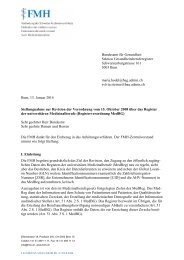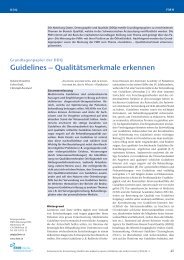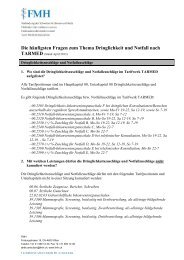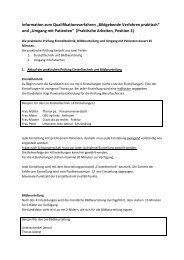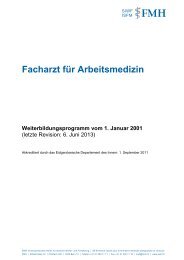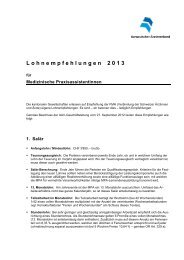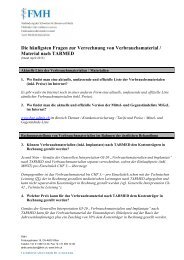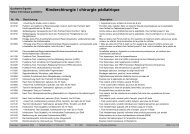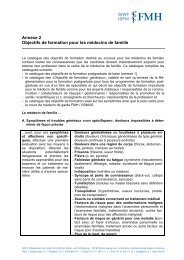- Seite 1 und 2:
Anhang 1 zur Standesordnung FMH Ric
- Seite 3 und 4:
Anhang 1 zur Standesordnung FMH geg
- Seite 5 und 6:
Medizin-ethische Richtlinien Ausüb
- Seite 7 und 8:
I. PRÄAMBEL Die Mitwirkung von Är
- Seite 9 und 10:
3. Gutachtertätigkeiten und -situa
- Seite 11 und 12:
8. Ansteckende Krankheiten Im Falle
- Seite 13 und 14:
12. Ärztliche Unabhängigkeit Unab
- Seite 15 und 16:
Madrid Declaration on Ethical Stand
- Seite 17 und 18:
Wie alle SAMW-Richtlinien richten s
- Seite 19 und 20:
1. Das Arzneimittel wurde vom Arzt
- Seite 21 und 22:
Kapitel 9. F. Vorgehen bei Hungerst
- Seite 23 und 24:
Nach wie vor werden Personen, die s
- Seite 25 und 26:
Resolution on the Responsibility of
- Seite 27:
Herausgeberin Schweizerische Akadem
- Seite 30 und 31:
I. Präambel Zerebral schwerst gesc
- Seite 32 und 33:
1.1.2 Neurodegenerative Erkrankunge
- Seite 34 und 35:
2.3. Vertretung Jede Person kann au
- Seite 36 und 37:
Bei Neugeborenen darf auf Nahrungs-
- Seite 38 und 39:
Ad 4.1. (Behandlung und Betreuung:
- Seite 40 und 41:
Hinweise zur Ausarbeitung dieser Ri
- Seite 42 und 43:
Medizin-ethische Richtlinien Betreu
- Seite 44 und 45:
I. PRÄAMBEL Menschen in ihrer letz
- Seite 46 und 47:
Einbezug der vertretungsberechtigte
- Seite 48 und 49:
4.1. Beihilfe zum Suizid Gemäss Ar
- Seite 50 und 51:
Handeln im mutmasslichen Willen des
- Seite 52 und 53:
IV. EMPFEHLUNGEN ZUHANDEN DER ZUST
- Seite 54:
Herausgeberin Schweizerische Akadem
- Seite 57 und 58:
Medizin-ethische Richtlinien und Em
- Seite 59 und 60:
I. PRÄAMBEL 5 II. RICHTLINIEN (FÜ
- Seite 61 und 62:
I. PRÄAMBEL Die demographische Ent
- Seite 63 und 64:
II. RICHTLINIEN (FÜR ÄRZTE, PFLEG
- Seite 65 und 66:
2.5. Angemessene Aus-, Weiter- und
- Seite 67 und 68:
3.5. Information Die ältere, pfleg
- Seite 69 und 70:
4. Behandlung und Betreuung 4.1. Ge
- Seite 71 und 72:
Die ältere Person (bzw. bei deren
- Seite 73 und 74:
Das Wohn- und Pflegeheim hat die Pe
- Seite 75 und 76:
Das Personal behandelt Beobachtunge
- Seite 77 und 78:
4. Behandlung und Betreuung Sichers
- Seite 79 und 80:
6. Dokumentation und Datenschutz Di
- Seite 81 und 82:
IV. ANHANG Literatur Rechtliche Gru
- Seite 83 und 84:
United Nations. United Nations Prin
- Seite 85:
Herausgeberin Schweizerische Akadem
- Seite 89 und 90:
Biobanken: Gewinnung, Aufbewahrung
- Seite 91 und 92:
der direkt betroffenen Personen, ab
- Seite 93 und 94:
3. Anforderungen an Biobanken Die L
- Seite 95 und 96:
3.3. Weitergabe von Proben und Date
- Seite 97 und 98:
Für den Spender sind insbesondere
- Seite 99 und 100:
Im Falle eines Widerrufs müssen di
- Seite 101 und 102:
Besteht infolge längeren Zeitablau
- Seite 103 und 104:
Deutsche Gesellschaft für Medizini
- Seite 107 und 108:
MEDIZIN- ETHISCHE Palliative Care R
- Seite 109 und 110:
I. PRÄAMBEL 5 II. RICHTLINIEN 6 1.
- Seite 111 und 112:
II. RICHTLINIEN 1. Definition Unter
- Seite 113 und 114:
Die Orientierung an der Würde des
- Seite 115 und 116:
Drücken Angehörige den Wunsch aus
- Seite 117 und 118:
- Eltern erhalten Zeit und Raum um
- Seite 119 und 120:
- Eine Sequentialität zwischen kur
- Seite 121 und 122:
entscheidend werden. Massgeblich si
- Seite 123 und 124:
III. EMPFEHLUNGEN Die nachstehenden
- Seite 125 und 126:
Hinweise zur Ausarbeitung dieser Ri
- Seite 128 und 129:
Version '13 Richtlinien der Schweiz
- Seite 130 und 131:
Richtlinien der Schweizerischen Aka
- Seite 132 und 133:
Die SAMW ist sich bewusst, dass sol
- Seite 134 und 135:
2. Institutionen, die klinische For
- Seite 136 und 137:
8. Bei der Publikation und Präsent
- Seite 138 und 139:
Richtlinien 1. Den Antrag auf Anerk
- Seite 140 und 141:
Die ganze oder teilweise Rückersta
- Seite 142 und 143:
5. Ein Arzt beteiligt sich an einer
- Seite 144 und 145:
v. Anhang Glossar Advisory Board Au
- Seite 146 und 147:
Relevante Bestimmungen und Behörde
- Seite 148 und 149:
Ad II. Aus-, Weiter- und Fortbildun
- Seite 150:
Bestelladresse SAMW Petersplatz 13
- Seite 153 und 154:
Medizin-ethische Richtlinien und Em
- Seite 155 und 156:
I. PRÄAMBEL 5 II. RICHTLINIEN 7 1.
- Seite 157 und 158:
Weil beim Eintritt eines Herzkreisl
- Seite 159 und 160:
2. Reanimationsentscheid 2.1. Ethis
- Seite 161 und 162:
Fehlt eine schriftliche Patientenve
- Seite 163 und 164:
Patienten unter Herzkreislaufüberw
- Seite 165 und 166:
2.5. Entscheidfindung Der Reanimati
- Seite 167 und 168:
3. Vorgehen in der Situation eines
- Seite 169 und 170:
Schlechte prognostische Faktoren:
- Seite 171 und 172:
III. EMPFEHLUNGEN Nachfolgend werde
- Seite 173 und 174:
Wiederbelebungsversuche ausserhalb
- Seite 175 und 176:
an kleinen Kollektiven erhoben. Hä
- Seite 177 und 178:
3. Quellennachweis zum Anhang 1 Jac
- Seite 179 und 180:
Hinweise zur Ausarbeitung dieser Ri
- Seite 182 und 183:
Verwendung von Leichen und Leichent
- Seite 184 und 185:
2. Rechtliche Rahmenbedingungen Der
- Seite 186 und 187:
Patientengesetze enthalten zudem So
- Seite 188 und 189:
3.4. Kurse in der Verantwortung ext
- Seite 190 und 191:
deten Empfehlungen des Europarates
- Seite 192:
Deklaration von Helsinki zu verweis
- Seite 196 und 197:
Lebendspende von soliden Organen Me
- Seite 198 und 199:
Lebendspende von soliden Organen Me
- Seite 200 und 201:
II. Richtlinien 1. Geltungsbereich
- Seite 202 und 203:
3.1. Voraussetzungen der Entnahme G
- Seite 204 und 205:
4. Information des Spenders Spender
- Seite 206 und 207:
dass nicht mehr von Frei willig kei
- Seite 208 und 209:
- Zugänglichkeit einer adäquaten
- Seite 210 und 211:
6.2.5. Spender, die nicht spenden w
- Seite 212 und 213:
7.2. Nierenempfänger Die Abklärun
- Seite 214 und 215:
7.4. Leberempfänger Die Abklärung
- Seite 216 und 217:
10. Spendernachsorge In der Regel i
- Seite 218 und 219:
III. Anhang: Kontrollparameter Spen
- Seite 220 und 221:
- Nach Möglichkeit sollten die Spi
- Seite 222 und 223:
- Vermeidung von Problemen bei Wech
- Seite 226 und 227:
MEDIZIN- THISCHE Medizinische Behan
- Seite 228 und 229:
I. PRÄAMBEL 5 II. RICHTLINIEN 7 1.
- Seite 230 und 231:
I. PRÄAMBEL Eine bedeutende Anzahl
- Seite 232 und 233:
II. RICHTLINIEN 1. Geltungsbereich
- Seite 234 und 235:
− bei Patienten mit eingeschränk
- Seite 236 und 237:
In der medizinischen Betreuung ist
- Seite 238 und 239:
− allenfalls benötigte Drittpers
- Seite 240 und 241:
4. Entscheidungsprozesse Entscheidu
- Seite 242 und 243:
4.3. Entscheidungsfindung im Betreu
- Seite 244 und 245:
Nach Überwinden der Akutsituation
- Seite 246 und 247:
5.7. Sterben und Tod 25 Tritt eine
- Seite 248 und 249:
Ursachen für Vernachlässigung kö
- Seite 250 und 251:
Bei Menschen mit eingeschränkter U
- Seite 252 und 253:
8.3. Elternschaft Bei Kinderwunsch
- Seite 254 und 255:
− den Übergang von der Kinder- u
- Seite 256 und 257:
Bei der Beantwortung der Frage, zu
- Seite 258 und 259:
− Partnerschaftliche Zusammenarbe
- Seite 260 und 261:
Sozial-medizinische Institution Als
- Seite 262:
Herausgeberin Schweizerische Akadem
- Seite 265 und 266:
Feststellung des Todes mit Bezug au
- Seite 267 und 268:
unterstützen. Diesem Ziel dienen d
- Seite 269 und 270:
Bei Neugeborenen 12 ist aufgrund vo
- Seite 271 und 272:
3.3. Spezifische Aspekte bei Kinder
- Seite 273 und 274:
auch die Lunge möglich. Die Angeh
- Seite 275 und 276:
siliarärzten, Angehörigen und der
- Seite 277 und 278:
B. Technische Zusatzuntersuchungen
- Seite 279 und 280:
Name und Vorname des Patienten: C.
- Seite 281 und 282:
D. Flowchart Feststellung des Todes
- Seite 283:
Hinweise zur Ausarbeitung dieser Ri
- Seite 292 und 293:
Bei Urteilsunfähigkeit ist der Ein
- Seite 294:
schluss der Betreuenden zu erfolgen
- Seite 299 und 300: Richtlinien 1. Geltungsbereich Dies
- Seite 301 und 302: Der Arzt offenbart medizinisch-gene
- Seite 303 und 304: 2. Kein Verzicht auf pränatale Unt
- Seite 305 und 306: Schweizerische Akademie der Medizin
- Seite 307 und 308: Foetalgewebe entnehmen bzw. transpl
- Seite 309 und 310: 2.3 Aufsichtsinstanz Die Zentrale E
- Seite 311 und 312: Der Empfänger könnte eine später
- Seite 313 und 314: 12 Strong C. Fetal tissue transplan
- Seite 315 und 316: 2 darauf zu antworten, und die der
- Seite 317 und 318: 4 als bei der Verwendung von Affen,
- Seite 319 und 320: 6 4.4. Kriterien für die Auswahl v
- Seite 321 und 322: 8 Kommission sollte berechtigt sein
- Seite 323 und 324: 10 - Ethische Überlegungen zur Ver
- Seite 325: Zwangsmassnahmen in der Medizin Med
- Seite 328 und 329: Zwangsmassnahmen in der Medizin Med
- Seite 330 und 331: II. Richtlinien 1. Geltungsbereich
- Seite 332 und 333: dass die Einweisung durch erfahrene
- Seite 334 und 335: 3. Entscheidungswege 3.1. Generelle
- Seite 336 und 337: 10 3.1.3. Entscheidungswege bei Min
- Seite 338 und 339: Schwere Selbstgefährdung Selbstgef
- Seite 340 und 341: Die ältere Person bzw. ihre Vertra
- Seite 342 und 343: Verboten sind Handlungen, die unnö
- Seite 344 und 345: 4.2.4. Dokumentation Alle Zwangsmas
- Seite 346: Impressum Gestaltung vistapoint, Ba
- Seite 359 und 360: DoH/Oct2008 25. For medical researc



